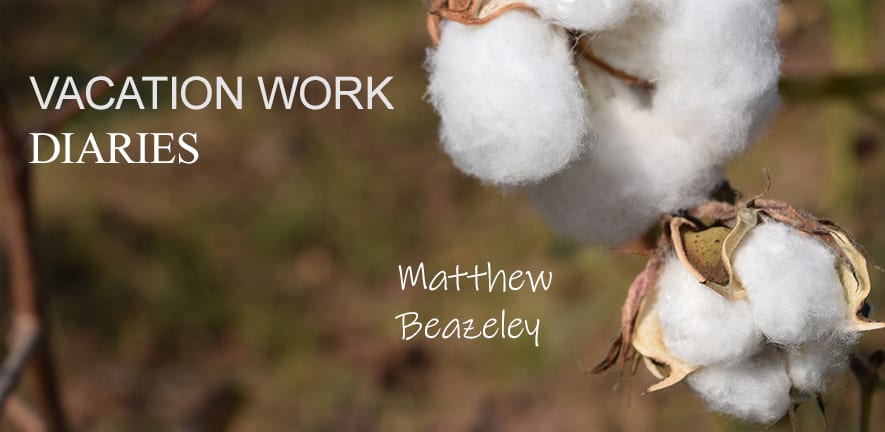
Matthew Beazeley, a second year HSPS student from Churchill College, reveals all regarding his voluntary research project with Traidcraft Exchange
I’m from Chelmsford in Essex.
Within my HSPS course, I am taking the Politics & International Relations track, which was a choice partly influenced by an interest in international development before I came to Cambridge.
At the start of last summer, I was looking for some kind of experience of any kind…
I was keen to do something productive with my holidays and to acquire some form of skills and connections in whatever sector possible. I looked at various options, but there were very few formal programmes for a first year undergraduate, and I was unsuccessful in everything I applied for. Fortunately, my girlfriend’s mum, who knew of my interest in international development and the NGO sector, gave me the details of a former teacher of hers from India, who now works at Traidcraft Exchange. I hadn’t heard of Traidcraft previously, but I looked into the work that they did, and was excited as the prospect of contributing in any way possible.
Learn how to utlilise your own network to find opportunities
The work Traidcraft Exchange does is twofold:
it aims to help poor producers in developing nations grow their businesses, find markets, and increase their bargaining power through co-operation; and it also lobbies and advises governments and other organisations to improve trade rules and market access for small producers in the developing world. I got in touch with Traidcraft Exchange and we discussed ways in which I could assist their work over the summer – we concluded that a desk-based voluntary research project was the best option, especially given that their main offices are a long way from where I live. This arrangement also allowed me to do part-time paid work around this project.
My task was to conduct research into the environmental impacts of the cotton supply chain in India.
One of Traidcraft Exchange’s latest targets is to improve the environmental sustainability of all the work that it does, and this involves a first step of becoming aware of the existing problems in the supply chains it works in. I was keen to focus my research on India, given Traidcraft’s presence there, and my desire to learn more about a country which I had not encountered much in my degree. My supervisor, George, laid out the framework of my project, giving me a research brief and some sub-questions to focus my research. I was investigating two specific stages of the cotton supply chain – ginning and spinning – because these were two intermediary stages processes Traidcraft knew little about, other than that they employed a significant number of people. Thus, with the overall brief of researching the energy usage, the waste treatment, and the health hazards to workers of the cotton ginning and spinning processes, I searched the internet for any reports or articles which could provide more information on these issues. I also contacted many companies in India to try and better understand how these processes worked and where their energy for the different inputs came from.
Over the course of the research project, I learned a great deal…
both about the specific environmental impacts of this supply chain in India, but more broadly about how to read through dense reports, get the relevant information and organise it into a coherent framework from which to write a report. My end goal was to produce two reports – a summary report and a full report – documenting the current state of affairs and potential areas for improvement and future policy action. I also presented my findings on a conference call to people who worked in different departments in Traidcraft, including in India, which was the final stage of my project.
 The biggest challenge of this work was the independence of it.
The biggest challenge of this work was the independence of it.
I was working from home on my own, and some of the information was difficult to find. India is an enormous country and there is often regional variation in terms of how well-documented certain health records are, or how much information the ginning or spinning businesses give about the energy usage in their factories. As such, it was difficult to build a clear picture of what was going on, and I often had to extrapolate from the data that I could find and make some assumptions about the overall picture in India. However, I was lucky that I had a weekly call with my supervisor to see how I was getting on and to focus my research for the next week, which really helped me ensure I was going in the right direction. Also, my supervisor and others at Traidcraft were able to put me in touch with their contacts in the industry who could give me a lot of information which wasn’t easy to find online. More broadly, everyone at Traidcraft was very appreciative of the fact I was helping them, and really made me feel like my work was making a difference and that I was finding things that they would be able to use in the future. They were very flexible, and gave me a lot of autonomy in deciding how much time I wanted to spend on the project and when I would be ready to present my findings. The most rewarding part of the role on the whole was the fact that Traidcraft are looking into commissioning further research on the ground in India on one of the issues identified in my report, and I hope that the work I did could start a chain of events which leads to action being taken to protect workers exposed to harmful dust in their working environment.
In all honesty, I have not got a fixed long-term plan of where I want to take my career.
In the early years after graduation I want to get as diverse a range of experiences as possible. Ideally, I would work in a very different roles and a few different sectors to see what interests me and what I find most rewarding. I have been interested in management/strategy consultancy recently, because it offers work that is constantly changing and gives exposure to a number of different sectors, with different consultancy firms specialising in different industries and types of advice. Ultimately, my end goal is to find a career path that gives me a high scope for social impact, whether that is working in public policy or starting my own business of some kind!
organisations in the development sector will usually be very keen to have students doing some research of any kind for them
In the first two terms of this year I applied for dozens of internships at consultancy firms.
I was eventually successful in getting an internship at a consultancy called Plural Strategy. Their specialisms lie in the events, education, and agribusiness sectors, and their clients include both the businesses in these sectors themselves, and private equity firms looking to invest in firms in those sectors. I am excited to work on a number of different projects and learn a lot of new skills in the world of business. Also, this Easter I will be doing a week’s work experience at a local financial advisory firm, which I got through emailing various local businesses asking if they would be willing to give me any experience.
Don’t be afraid to put yourself out there and send off some emails to any organisation you are interested in.
I ended up working for this NGO through a mutual friend, but organisations in the development sector will usually be very keen to have students doing some research of any kind for them, as it can be extremely helpful for them. My project was not something that Traidcraft made up just to create some work for me – it was an area into which they genuinely wanted to look more closely, but did not have the resources to prioritise it at that time. In general, there is nothing to be lost by asking, and you might be surprised by what can turn up just through a polite email and an interest in the organisation you are seeking experience with. Even if it’s not paid work, you can be flexible with your time in working from home and you will learn a lot and have gained some valuable contacts and insight into a specific industry.
